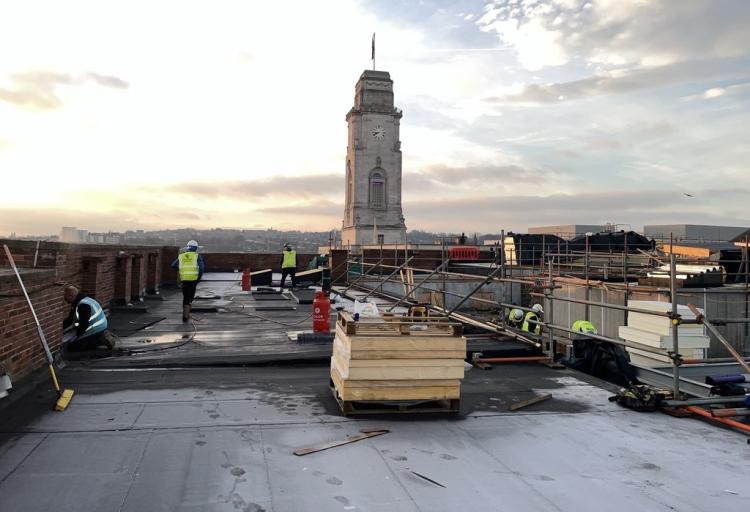From mining college to state-of-the-art Institute of Technology
Barnsley College forges ahead with net zero work
A former mining and technical college cannot wait to welcome back students to a site which has used state of the art engineering to meet ambitious net zero targets.
Barnsley College in South Yorkshire was awarded £2.3m under the Public Sector Decarbonisation Scheme for a project that will cost nearly £5m.
Whilst it closed its Institute of Technology building in Church Street to students in March 2024 – it is about to welcome them back in September to continue offering technical educational qualifications in a state-of-the-art hub.
Transforming a landmark site
Our teams at Salix are working with the college to achieve its sustainability goals thanks to the Phase 3c Public Sector Decarbonisation Scheme funding. We went along to explore how the new technology will transform how students and the team will use the art deco building in Church Street, Barnsley.
An aerial view of the site
Photo credit: Barnsley College
As well as the Public Sector Decarbonisation Scheme project, the town centre college is also undergoing a further ambitious programme of works with a full upgrade of sustainable technologies.
Barnsley College’s Sustainability Strategy was launched in 2022 and was one of the first in the further education sector. It is a high-level strategy that drives the colleges sustainability commitments. The idea is that it gives ownership to anyone in the college who wishes to make positive and sustainable change.
The strategy outlines a long-term vision for carbon reduction and improving environmental sustainability and gives focus to measuring success against the colleges long-term goals.
Paul Langton, director of capital projects at Barnsley College, said: “The College is delighted to be working with Salix on this flagship Institute of Technology project.
“The landmark art deco building, formerly Barnsley Mining and Technical College, is being sensitively transformed into a modern, facility to retain and enhance the classic architecture inside and out.”
Funding for the project is a combination of Department for Education (DfE) regional investment, and college capital funds.
Following the success of the Public Sector Decarbonisation Scheme capital bid for sustainability upgrades throughout the building, when complete, the almost century old Church Street building will be one of the most sustainable properties on the college estate.
Paul added: “These extensive sustainability measures will ensure the building is developed in line with Barnsley Council’s decarbonisation plans for its Zero 45 ambitions.”
Our Salix client support officer Molly Evanson has been working with the college supporting the team throughout its Public Sector Decarbonisation Scheme journey.
She said: “It’s incredible to think that the Church Street building cost a total of £110,012 to build and furnish in 1932.
“It has gone through various uses but has maintained an educational focus throughout its lifespan. Now we’re seeing modern technology in a building designed for the technology of 1932.
It’s incredible to think that the Church Street building cost a total of £110,012 to build and furnish in 1932.
It has gone through various uses but has maintained an educational focus throughout its lifespan. Now we’re seeing modern technology in a building designed for the technology of 1932.

Work in progress on the rooftop of Barnsley College
Photo credit: Barnsley College
“Today and for the future, this work means the college can continue to offer a great learning environment in a building that is better for the environment.
“It’s a privilege to be on this net zero journey with Barnsley College.”
When we visited the Institute of Technology which is used to teach technical qualifications in engineering, construction and IT/digital subjects, our team discussed the air source heat pump, building and wall insulation as well as the solar PV.
Whilst the works are aimed at bringing the site into the modern era, it is also designed to retain and enhance its classic architecture.
Once the works are complete the college says it will become one of the country’s most sustainable campuses. The net zero target for the college is 2045 which is in line with the climate emergency Barnsley Metropolitan Borough Council declared in 2019.



